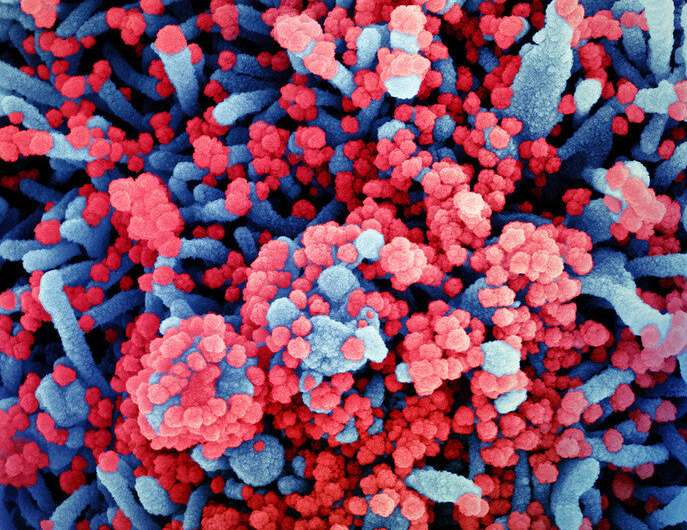Colorized scanning electron micrograph of a cell (blue) heavily infected with SARS-CoV-2 virus particles (red), isolated from a patient sample. Image captured at the NIAID Integrated Research Facility (IRF) in Fort Detrick, Maryland. Credit: NIAID
The COVID-19 pandemic is a global health crisis. Insights into why some people develop more severe symptoms than others and how to better treat the disease are desperately needed. The COVID-19 Host Genetics Initiative was created to study the relationship between variation in the human genome and SARS-CoV-2 infection. This is an ongoing, international, collaborative effort to learn the genetic determinants of COVID-19 susceptibility, severity, and outcomes. Andrea Ganna, Ph.D., EMBL-group leader at the Institute for Molecular Medicine Finland and an instructor at Harvard Medical School and Massachusetts General Hospital, presented the results of the initiative's first genome-wide association studies and follow-up analyses at the American Society of Human Genetics 2020 Virtual Meeting.
The COVID-19 Host Genetics Initiative (HGI) was formed in March 2020 as a way to bring together the international human genetics community to generate, share, and analyze data related to COVID-19 infection and outcomes. The decentralized initiative has three main goals: 1) provide an environment to foster resource sharing to facilitate COVID-19 host genetics research; 2) organize analytical activities across studies to identify genetic determinants of COVID-19 susceptibility, severity, and outcomes; and 3) provide a platform to share results as well as individual-level data from such studies.
By June 2020, the HGI included 190 studies from 46 countries and more than 1,100 researchers.
"Our biggest accomplishment so far is bringing this community together," says Dr. Ganna. "One of our strengths is the inclusion of researchers from countries that are underrepresented in large genetic consortia, such as Qatar and Brazil."
Collaboration is essential for battling a global pandemicsays Dr. Ganna. Sharing and combining data is necessary to gather enough cases together and increase the power of studies to tease out significant results.
At the virtual meeting, Dr. Ganna presented the results of the latest meta-analyses. Like all of the HGI's results, they are immediately available on the initiative's website (https://www.COVID19hg.org/) without any restriction of use.
Dr. Ganna says this model of data sharing is unique. "Traditional genetic consortia come together with the main goal of publication, after which the results are shared," he says. "Here, we use an alternate approach—we share the results immediately.
"We are currently working on a third meta-analysis and are immediately making the results available while slowly working towards publication."
Dr. Ganna and his colleagues hope that these and future findings will help researchers gain a more thorough understanding of the biology of COVID-19. Discoveries from the HGI could help identify individuals at unusually high or low risk for infection or complications, generate hypotheses for novel therapeutics, and contribute to global knowledge of the biology of COVID-19. Discoveries from the HGI could help identify individuals at unusually high or low risk for infection or complications, generate hypotheses for novel therapeutics, and contribute to global knowledge of the biology of SARS-CoV-2 infection and disease.
"We expect the COVID-19 Host Genetics Initiative to substantially contribute to the understanding of the variability of this disease in the population within the next few months," says Dr. Ganna.
More information: A. Ganna (Date). Abstract: The COVID-19 Host Genetics Initiative: a global effort to identify genetic factors of COVID-19 susceptibility, severity, and outcomes across > 190 studies worldwide. Presented at the American Society of Human Genetics 2020 Virtual Meeting.
Provided by American Society of Human Genetics























